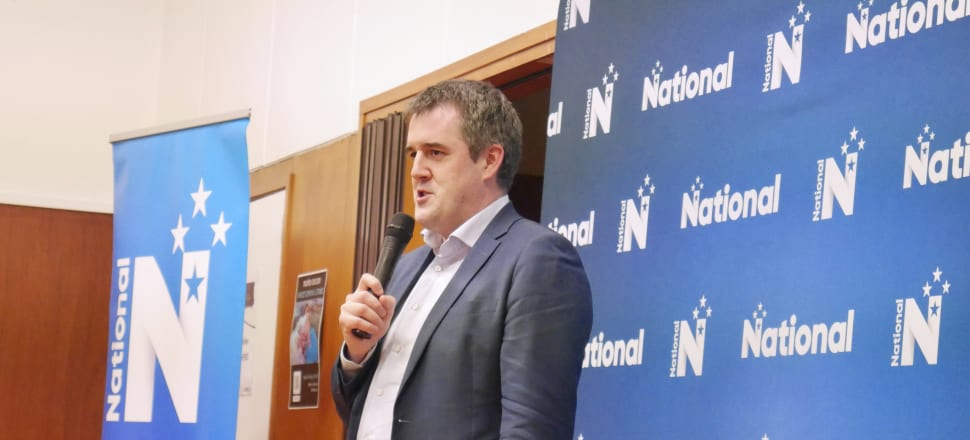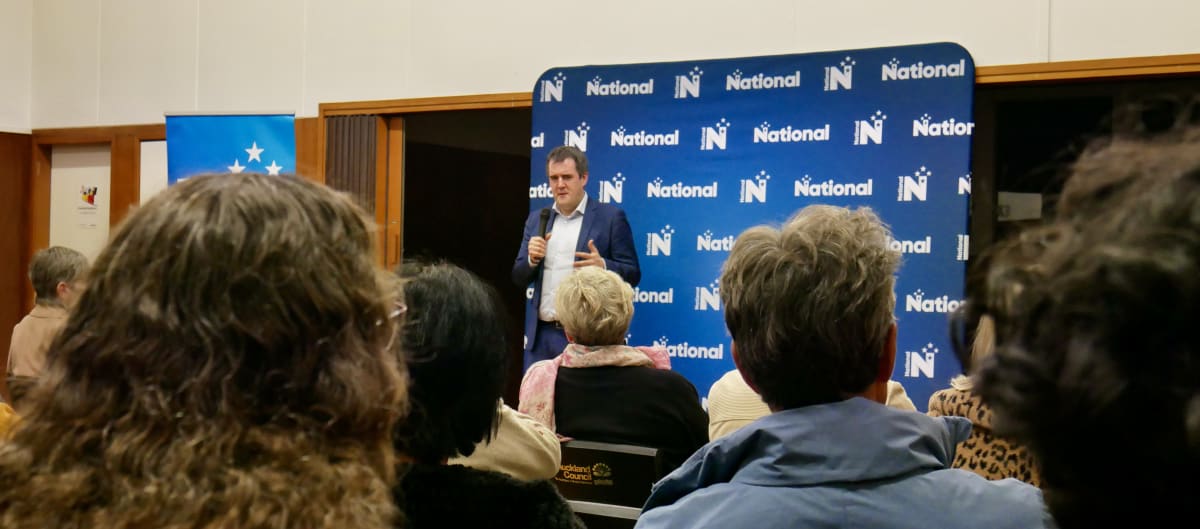
Although the party line is a backtrack on housing legislation, Chris Bishop doesn’t want to wave aside the need for intensification
The National Party election campaign is chugging along in high gear with just four months left until the finish line, with senior MPs working through a steady schedule of public meetings where they can spell out their main election goals.
But while the tight list of talking points has been circulated amongst the party elite, it’s been the crowds themselves who have often been able to choose the agenda.
READ MORE:
* Crime top of mind for Luxon crowd
* Battle for Auckland over inner-city villas
Last night, National Party housing spokesperson Chris Bishop met a group of concerned locals in Northcote to discuss housing policy and was forced to explain his own moderate position on controversial housing legislation.
Lately in Auckland, when people think of housing they think of the never-ending argument surrounding residential zoning – a tension that has ratcheted up in recent years between proponents of denser cities and defenders of the status quo for villa-lined suburban streets.
New legislation put down in 2020 is expected to soon open up transit corridors and city centres to denser development.
For the residents of Northcote – at least many of the 50 or so who turned up to see Bishop on a frigid Monday night – the new law risks allowing unchecked development to bring in residents that overwhelm local infrastructure and multi-level buildings to block sunshine and break aesthetic cohesion.
“We’re okay with density, so long as it's done well,” one woman told Bishop. Others raised concerns about build quality in the area or complained about the amount of parking a development had diverted onto their street.

“It’s disgusting,” said a resident who had found the parking space on their suburban street had been fully-occupied since 65 units had been built. “And what about the noise pollution of 65 heat pumps?”
Another woman worried about keeping the visual standards of her neighbourhood up if new houses weren’t built with spacious front yards.
“Aesthetics matter to me,” she said. “You will have seen down Lake Rd… little piddly-ass – pardon the term – little wee front yards: it’s getting like Coronation Street. If you get a larger front yard, then it gets more character to it.”
Suffice to say it’s not been a popular piece of legislation in every corner of Auckland. It was, however, popular in Parliament back in 2020, when every party except Act backed the bill.
Bishop himself along with National’s deputy leader Nicola Willis were apparently instrumental in putting the law together.
But in the past few months National has done a swift about-face on the medium-density standards, with party leader Christopher Luxon telling an audience last month that the party was wrong to sign up to it.
Whether begrudgingly or not, Bishop has quickly followed suit. Perhaps his suite of new housing policies are rushing in to fill the gap left by the medium-density standards.
These policies include mandating the amount of land local councils need to set aside for residential zoning, cutting red tape around infrastructure development and the creation of a $1 billion fund to pay out incentives to the councils who build the most homes.
In Northcote, however, it seems the votes will be ensured if he can just promise to get medium-density standards out the door and quickly.
“Give us a few weeks, we’ll have a 100-day plan,” Bishop said when asked how long it would take for the legislation to be repealed. But at the same time he told the audience that National’s plan was to “aggressively go for housing growth”.
He said he was pro-intensification but also didn’t want a free-for-all or a one-size-fits-all approach.
He said communities had spoken up wanting more flexibility, "but councils must show they can meet future demand by either zoning land though greenfield development or though greater density".
Communicating the subtle difference between the two – slowing down the current projected rate of intensification while also fixing the housing shortage – may be Bishop’s biggest challenge on the 123 days left on the road to the election.
He strikes a relatively moderate position on many issues for somebody who could hold a portfolio in a potential centre-right coalition, and sometimes the nuance of a tempered position is hard to get across in the span of a single speech.
That could be why he found himself fielding a question on how his cost-cutting ambitions could possibly square with his desire to fix the country’s infrastructure deficit.
Early in his speech he told the crowd that National would pull back on government spending and focus on the basics. He soon thereafter said it would be an “infrastructure government” – meaning “central government is going to have to step up with more money”.
How can both be true?
Bishop said it’s a matter of increasing productivity, better planning, bolstering public-private partnership and looking into user-pays mechanisms like toll roads.
We may find out if his explanation mollified onlookers only on election day. For now, it’s safe to say that a more impassioned position on either side of the spend-save continuum is easier to defend and certainly easier to sell.







